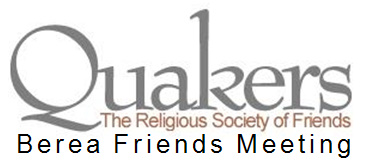

| Home |
| For Newcomers |
| Calendar & Newsletters |
| Committees & Contacts |
| Working for Peace & Justice |
| Directions |
| Donate |
| Rentals |


The historical circumstances in which Quakers first arose had a profound effect, not only on their relationship with God, but on their relationship with the world besides. This interrelation between the religious outlook of Friends and their wider outlook on the world is, perhaps, most vividly reflected in the Quaker Testimonies. The Religious Society of Friends has, from its very inception, tended to eschew outward manifestations of religious doctrine and ritual; granting greater credence, instead, to the guidance provided by the inner spiritual leadings of its members. For this reason, Quakerism has been described by some as a particularly non-creedal form of worship that does not espouse any particular set of beliefs. This view is belied, however, by the existence of the Quaker Testimonies, which set out several explicit principles for good living to which Friends consistently refer in ordering their lives. Today, these testimonies are generally organized around the principles of peace, equality, integrity and simplicity; four basic tenets to which most every Friend subscribes.
The Peace Testimony was born out of first-hand experience of the English Civil War. Exposure to the bloody aftermath of this intractable civil conflict led prominent early Friends to “utterly deny” the employment of “all outward wars and strife and fightings with outward weapons, for any end or under any pretence whatsoever" (A Declaration from the harmless and innocent people of God, called Quakers). This absolute assertion of the illegitimacy of physical violence quickly became an integral element of Quaker belief. At the same time, though, it is interesting to note how the Peace Testimony implicitly does not call for the abatement of inward forms of strife. All forms of physical violence are categorically disallowed by the Peace Testimony. At the same time, it leaves the door more than open for inner spiritual struggle, verbal debate and conscientious dissent.
The Testimony of Integrity is essentially a call for consistency between what a person professes and their actions in "real life." It entails a recognition that, in order for a person to attain godliness or perfection, there needs to be concordance between what they think, say and do; which is to say, there must be a harmony between one’s physical and spiritual existence. The Quaker call for integrity is also connected to the Peace Testimony, insofar as honesty is to peace as deception is to war. Ironically, the commitment of early Friends to openness in telling the truth often resulted in their persecution, as it prevented them from swearing oaths (for so swearing would have implied that they did not necessarily tell the truth when not under oath). In later years, though, Quakers came to be renowned and esteemed for their honesty as manifested, for instance, in their development of the single pricing market system.
The Testimony of Simplicity carries the Quaker ethic a step further by applying it to the details of daily life. Just as the external trappings of ritual and doctrine were felt to interfere with the inner spiritual communion essential to true religious worship; so, too, the presence of physical luxury—to say nothing of the consumption of alcohol, tobacco or excessive eating—was also felt to impede the development of a person’s inner spiritual growth. Living a life of material simplicity also allowed Friends greater latitude for charitable giving, which had the salutary effect of bringing them still closer to the perfection of God. In contemporary times, the Testimony of Simplicity has gained renewed credence with the ascendance of the ecology movement, which decries the heavy burden excessive human consumption places on the environment.
The central importance to Friends of the Testimony of Equality is exemplified by their corollary theological belief in "that of God in everyone." The idea that everyone has at least potential access to God’s leadings was a radical declaration of theological equality when first formulated by Fox. It has since gone on to play a defining role in the history of Quakerism. The principle of equality is manifested, for instance, in the recognition and status accorded to the rights and gifts of women from the very earliest incarnations of the Quaker movement. To a group of people who held that women no more have souls than does a goose, Fox countered with the words of Mary, who said that: “My soul doth magnify the Lord, and my spirit hath rejoiced in God my Saviour" (Fox, The Journal, 1646-7, pg. 11). In the following century, the Testimony of Equality led Friends to free their slaves and assume leading roles in calling for the abolition of slavery. By the time of the American Revolution, it had become plausible to declare the fundamental equality of all human beings to be a self-evident truth; though it would still take centuries for this truth to be refelcted in the laws of the land.
Wilmer Cooper, Survey Report on Proposed Friends School of the Ministry, Earlham School of Religion, 1959
300 Harrison Road, Berea, KY
859-334-0406 voice mail only
info@bereafriends.org

